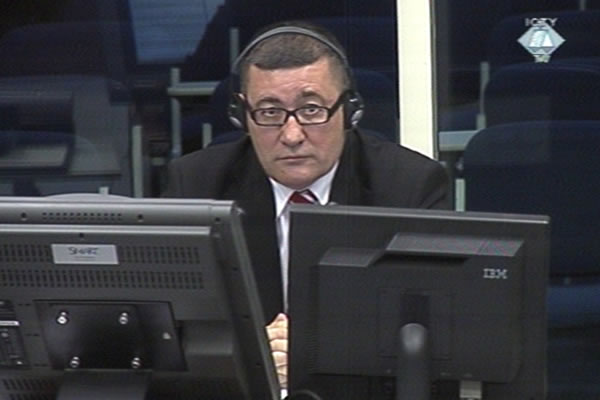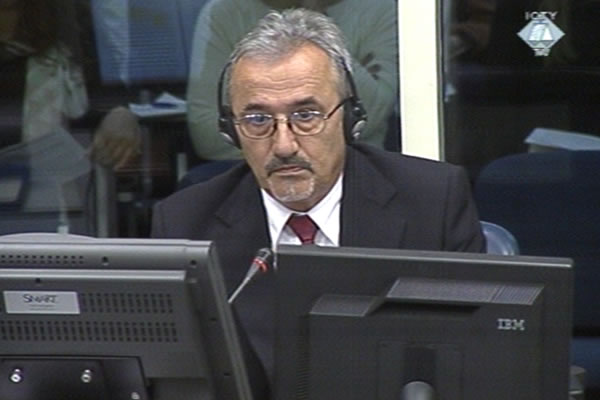Home
‘BEST OF THE BEST’ TESTIFIES IN KARADZIC’S DEFENSE
General Milenko Karisik readily agreed with the prosecutor that he was indeed a ‘brilliant professional’ and the ‘best of the best’ in the Republika Srpska police. It wasn’t long before Karisik had to explain how it was possible that as a brilliant professional he didn’t know what had happened to the men from Srebrenica. Karisik regularly received reports about the detention of the men from Srebrenica. Colonel Mirko Trivic completed his evidence before Karisik took the stand. Trivic spoke about the consequences of Directive 7, a document bearing the signature of the accused
 Milenko Karisik, defence witness of Radovan Karadzic
Milenko Karisik, defence witness of Radovan Karadzic Former commander of the 2nd Romanija Brigade Mirko Trivic entered Srebrenica with an element of his unit in July 1995. Today, he spared no effort to exonerate Radovan Karadzic for the crimes committed during and after that operation. In his statement to the defense team, Trivic said that the supreme commander didn’t believe that the enclaves of Srebrenica and Zepa should disappear. According to Trivic, Karadzic never ordered the removal of Muslims from the enclaves.
In the cross-examination, prosecutor Pack focused on Directive 7. In the document issued in March 1995, Karadzic ordered the army to create conditions of ‘total insecurity without hope for further life or survival for the inhabitants of Srebrenica and Zepa’. Previous defense witnesses have claimed that the president was tricked into signing the document. Unlike them, Trivic said that ‘whoever signs a document is responsible’, with no exceptions. Trivic nevertheless tried to play down the importance of the directive. In Trivic’s words, the purpose of the document was to motivate the people in the enclaves to ‘take measures against their political leadership’.
The prosecutor reminded the witness that recently, in his evidence as a prosecution witness at the trial of Ratko Mladic, he has stated that Directive 7 contained ‘some astonishing vocabulary’. Today Trivic skirted the issue, saying that these were ‘not words, but a written document’. Trivic added that he had never received an order containing such ‘astonishing’ items. The prosecutor contested this claim by showing a document of the Drina Corps sent to Trivic’s unit on 20 March 1995. The document contains the same vocabulary as the document written by Karadzic. The witness admitted that he had received the document but ‘didn’t pay attention to it’. At the time he wasn’t involved in any attacks on the enclaves, the witness explained. The witness said he would never comply with an order of that kind because it was a ‘criminal offence’.
When Srebrenica was captured, Trivic and his unit moved on towards Zepa, on 13 July 1995. That afternoon, Trivic passed by the football stadium in Nova Kasaba. The stadium was packed with Muslim captives. In an effort to be very accurate, Trivic called them ‘disarmed enemy soldiers’. Since they didn’t surrender immediately after Srebrenica fell, Trivic argued, they could not be accorded the status of prisoners. Presiding judge Kwon wanted to know if that meant they were to be executed. The witness replied that he never said anything of the kind.
After Trivic completed his evidence, Karadzic called his next defense witness, General Milenko Karisik, former commander of the Bosnian Serb police special brigade. At the time of the Srebrenica operation, Karisik was the chief of the Republika Srpska MUP Public Security Department. In his statement to the defense, Karisik said he didn’t receive the information that women, children and the elderly had been evacuated from Srebrenica. Likewise, he did not receive any reports about the detention and execution of the men and boys and couldn’t report to Karadzic about those events in turn.
At the beginning of the cross-examination, prosecutor Nichols put it to Karisik that he was a ‘brilliant professional’ and the ‘best of the best’ in the Republika Srpska MUP. Karisik agreed with those statements unreservedly. However, the praise didn’t help Karisik much when the cross-examination proceeded. Quite the contrary.
The prosecutor showed a number of documents indicating that at the time when Srebrenica was captured and in the aftermath Karisik regularly received reports form the State Security Service, from the Public Security Center in Zvornik, the special police commander Ljubomir Borovcanin and others. These reports stated that a large number of refugees had gathered in Potocari, that their plight would soon become ‘hopeless’ and that thousands of men had been captured. Karisik claimed that he didn’t read the reports; the prosecutor was compelled to ask him how he, as an ‘eminent professional in the top echelons of the police’ did not take notice of the documents, including urgent cables sent to him ‘personally’. The witness replied that at the time he was preoccupied with the problems in the Sarajevo theatre of war; Srebrenica was not his concern.
Karisik claimed he didn’t have to know that the special police brigade members had killed over 1,000 prisoners in Kravica or that a special police detachment from Zvornik joined the Srebrenica operation. Likewise, the witness didn’t know that the public security personnel secured the convoys heading from Bratunac to Zvornik. The prisoners in the convoys were later executed. If he had known about it at the time, he has forgotten everything in the meantime, the witness claimed. This prompted the prosecutor to ask Karisik if he had problems with memory. Karisik replied that he didn’t have any ‘medically confirmed’ memory problems. The only thing Karisik could remember was that on 13 July 1995 he forwarded a cable to the Zvornik police warning them of the movement of thousands of Muslim fugitives from Srebrenica. It is interesting to note that Karisik remembered that he had forwarded the document but couldn’t remember receiving the document mere moments before that.
The documents that the prosecutor presented showed that the commander of the special police, the Zvornik center leaders, the deputy minister, the minister and the state security chief all knew about the detention of the Srebrenica men and boys. ‘It seems everyone in the police above and below your rank knew about it, and that you were the only member of the MUP leadership that remained unaware of it’, the prosecutor concluded. Karisik briefly said, ‘that is correct’. Consequently, the witness couldn’t inform Karadzic about the events. The witness admitted that he met Karadzic in the evening of 13 July 1995. As the witness said, ‘to this day, I don’t know the scale, nature and perpetrators of the crimes’ in Srebrenica. According to him, he only learned about it from the press and there was ‘a lot of manipulations’.
Finally, the prosecutor noted that on 16 July 1995 Karisik was at a crime scene when travelled to Zvornik and passed by the execution sites of Pilica, Branjevo, Rocevic and Kozluk, where thousands of Muslims were executed on and around that date. When the prosecutor put it to him that he had driven down the ‘avenue of death’ the witness replied that the ‘road was clear’ and that he didn’t see any bodies.
Milenko Karisik’s cross-examination continues on Tuesday.Photos
Linked Reports
- Case : Karadzic
- 2013-06-26 RELATIONS BETWEEN KARADZIC AND MLADIC WERE ‘INTOLERABLE’
- 2013-06-25 ARKAN WAS ‘TO FORCE A PEACEFUL SOLUTION’
- 2013-06-24 IT SEEMED IMPOSSIBLE BUT TURNED OUT TO BE POSSIBLE
- 2013-07-02 POLICE GENERAL HAD NO AUTHORITY VIS-À-VIS CRIMES
- 2013-07-03 DENYING CRIME AT JADAR RIVER BANK
- 2013-07-05 AWARDS HANDED TO WRONG PEOPLE

